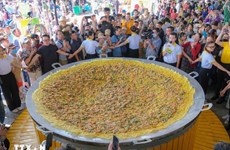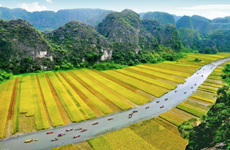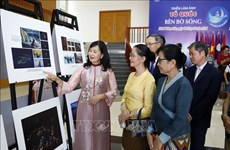Milestones in 2009 cultural diplomacy
The year of cultural diplomacy 2009 was deployed strongly and comprehensively,
contributing greatly to the foreign relations programme set out by the Party and
State.
The year of cultural diplomacy 2009 was deployed strongly and comprehensively,
contributing greatly to the foreign relations programme set out by the Party and
State.
Deputy Prime Minister and Minister for Foreign Affairs Pham Gia Khiem wrote these comments in an article entitled “Milestones in the Year of Cultural Diplomacy 2009.”
The year wrapped up with a series of noteworthy achievements in cultural diplomacy. In May, the United Nations Educational, Scientific and Cultural Organisation (UNESCO) recognised the Cham Archipelago and the Ca Mau Cape National Park as world biosphere reserves.
In June, Vietnam ’s Nguyen Dynasty wood-blocks were recognised documentary heritage under the Memory of Time programme. Three months later, traditional Bac Ninh love duet singing and “ca tru” (ceremonial songs) were named as part of mankind’s intangible cultural heritage, he wrote.
October marked another milestone in Vietnam ’s cultural diplomacy when the country was elected to the UNESCO Executive Council for its 2009-2013 term, and a resolution was adopted on participating in the celebrations of the 1,000th anniversary of Thang Long-Hanoi.
Following two diplomatic sector conferences organised in 2006 and 2008, cultural diplomacy has a firm foothold in the nation’s foreign affairs and has fostered diplomacy in politics and economics as well.
Amid the adverse impact of the global economic crisis, cultural diplomacy has been actively and creatively undertaken in synergy with political and economic diplomacy as well as overseas Vietnamese-related affairs, helping to create a firm foundation for the country’s comprehensive diplomacy.
It could be said that the biggest success gained during the year of cultural diplomacy was to make remarkable changes in the awareness and actions of all sectors and localities of the importance of the undertaking and form a basis for the continued implementation of this policy.
Cultural diplomacy has been clearly defined as a vital task not only for the Ministry of Foreign Affairs and the Ministry of Culture, Sports and Tourism, but for all agencies from central to local levels, and the entire society, the deputy PM noted.
The involvement of different forces, such as ministries, sectors, agencies, localities, businesses and people from all walks of life, have formed a combined strength, which is regarded as the most important factor in the recent success of cultural diplomacy.
These changes have created a momentum for regular and closer coordination among the Ministry of Foreign Affairs and the Ministry of Culture, Sports and Tourism, as well as concerned agencies and localities. This is an essential condition to ensure the efficiency and sustainability of cultural diplomatic activities.
Under the motto of “Bringing Vietnam to the world and bringing the world to Vietnam”, cities and provinces across the country worked together to organise cultural diplomatic activities and promote their images, Khiem wrote.
Mobilisation work saw various successes during the year as the Ministry of Foreign Affairs supported and joined hands with many localities to create documents to urge UNESCO to recognise a number of heritage sites and world cultural assets in the country.
Through mobilisation and promotional activities, cities and provinces were enabled to make their images, landscapes and cultural features better known to the world, promoting tourism, foreign investment and socio-economic development in the targeted localities.
In 2009, affairs related to overseas Vietnamese were expanded, with a wide range of diverse cultural activities organised in different countries such as the teaching of Vietnamese, a television programme linking Vietnamese abroad to their families at home called Xuan Que Huong (spring in the homeland) and various ‘Vietnam Days’ around the world. These activities attracted a large number of overseas Vietnamese and helped them preserve their national traditions and cultural identity.
Entering 2010--a year promising a series of important events for the country and the diplomatic sector in particular--cultural diplomacy needs to step up the promotion of Vietnam’s image and its harmonisation with political and economic diplomacy.
With these achievements obtained, the year of cultural diplomacy not only resulted in milestones in the diplomatic sector’s general success, but also created an impetus for the sector to further increase mutual understanding and friendly ties between Vietnam and the rest of the world in future, as well as promote the image of a beautiful, welcoming nation with limitless potential to international friends, the deputy PM added.
T o review the “Year of Cultural Diplomacy 2009”, on Feb. 5, the Foreign Ministry and the Ministry of Culture, Sports and Tourism jointly organised a meeting with the participation of ambassadors and chief representatives of foreign missions in Vietnam .
At the event, Deputy PM and Foreign Minister Pham Gia Khiem presented the Foreign Ministry’s certificates of merit to the Ambassadors of China, the Republic of Korea, Venezuela, Laos, Malaysia, Italy, and Morocco, and Panama chargé d'affaires in recognition of their contributions to activities of cultural diplomacy undertaken by Vietnam in 2009./.
Deputy Prime Minister and Minister for Foreign Affairs Pham Gia Khiem wrote these comments in an article entitled “Milestones in the Year of Cultural Diplomacy 2009.”
The year wrapped up with a series of noteworthy achievements in cultural diplomacy. In May, the United Nations Educational, Scientific and Cultural Organisation (UNESCO) recognised the Cham Archipelago and the Ca Mau Cape National Park as world biosphere reserves.
In June, Vietnam ’s Nguyen Dynasty wood-blocks were recognised documentary heritage under the Memory of Time programme. Three months later, traditional Bac Ninh love duet singing and “ca tru” (ceremonial songs) were named as part of mankind’s intangible cultural heritage, he wrote.
October marked another milestone in Vietnam ’s cultural diplomacy when the country was elected to the UNESCO Executive Council for its 2009-2013 term, and a resolution was adopted on participating in the celebrations of the 1,000th anniversary of Thang Long-Hanoi.
Following two diplomatic sector conferences organised in 2006 and 2008, cultural diplomacy has a firm foothold in the nation’s foreign affairs and has fostered diplomacy in politics and economics as well.
Amid the adverse impact of the global economic crisis, cultural diplomacy has been actively and creatively undertaken in synergy with political and economic diplomacy as well as overseas Vietnamese-related affairs, helping to create a firm foundation for the country’s comprehensive diplomacy.
It could be said that the biggest success gained during the year of cultural diplomacy was to make remarkable changes in the awareness and actions of all sectors and localities of the importance of the undertaking and form a basis for the continued implementation of this policy.
Cultural diplomacy has been clearly defined as a vital task not only for the Ministry of Foreign Affairs and the Ministry of Culture, Sports and Tourism, but for all agencies from central to local levels, and the entire society, the deputy PM noted.
The involvement of different forces, such as ministries, sectors, agencies, localities, businesses and people from all walks of life, have formed a combined strength, which is regarded as the most important factor in the recent success of cultural diplomacy.
These changes have created a momentum for regular and closer coordination among the Ministry of Foreign Affairs and the Ministry of Culture, Sports and Tourism, as well as concerned agencies and localities. This is an essential condition to ensure the efficiency and sustainability of cultural diplomatic activities.
Under the motto of “Bringing Vietnam to the world and bringing the world to Vietnam”, cities and provinces across the country worked together to organise cultural diplomatic activities and promote their images, Khiem wrote.
Mobilisation work saw various successes during the year as the Ministry of Foreign Affairs supported and joined hands with many localities to create documents to urge UNESCO to recognise a number of heritage sites and world cultural assets in the country.
Through mobilisation and promotional activities, cities and provinces were enabled to make their images, landscapes and cultural features better known to the world, promoting tourism, foreign investment and socio-economic development in the targeted localities.
In 2009, affairs related to overseas Vietnamese were expanded, with a wide range of diverse cultural activities organised in different countries such as the teaching of Vietnamese, a television programme linking Vietnamese abroad to their families at home called Xuan Que Huong (spring in the homeland) and various ‘Vietnam Days’ around the world. These activities attracted a large number of overseas Vietnamese and helped them preserve their national traditions and cultural identity.
Entering 2010--a year promising a series of important events for the country and the diplomatic sector in particular--cultural diplomacy needs to step up the promotion of Vietnam’s image and its harmonisation with political and economic diplomacy.
With these achievements obtained, the year of cultural diplomacy not only resulted in milestones in the diplomatic sector’s general success, but also created an impetus for the sector to further increase mutual understanding and friendly ties between Vietnam and the rest of the world in future, as well as promote the image of a beautiful, welcoming nation with limitless potential to international friends, the deputy PM added.
T o review the “Year of Cultural Diplomacy 2009”, on Feb. 5, the Foreign Ministry and the Ministry of Culture, Sports and Tourism jointly organised a meeting with the participation of ambassadors and chief representatives of foreign missions in Vietnam .
At the event, Deputy PM and Foreign Minister Pham Gia Khiem presented the Foreign Ministry’s certificates of merit to the Ambassadors of China, the Republic of Korea, Venezuela, Laos, Malaysia, Italy, and Morocco, and Panama chargé d'affaires in recognition of their contributions to activities of cultural diplomacy undertaken by Vietnam in 2009./.













